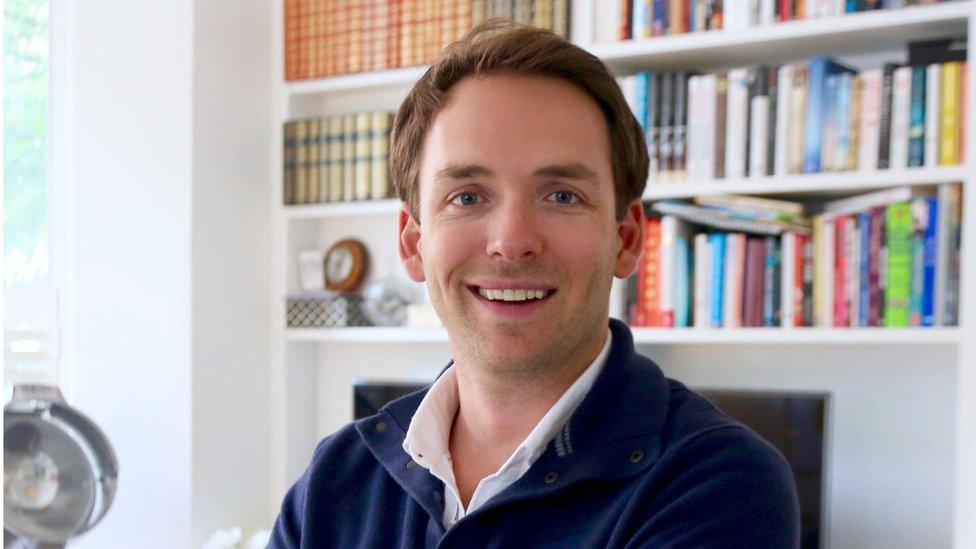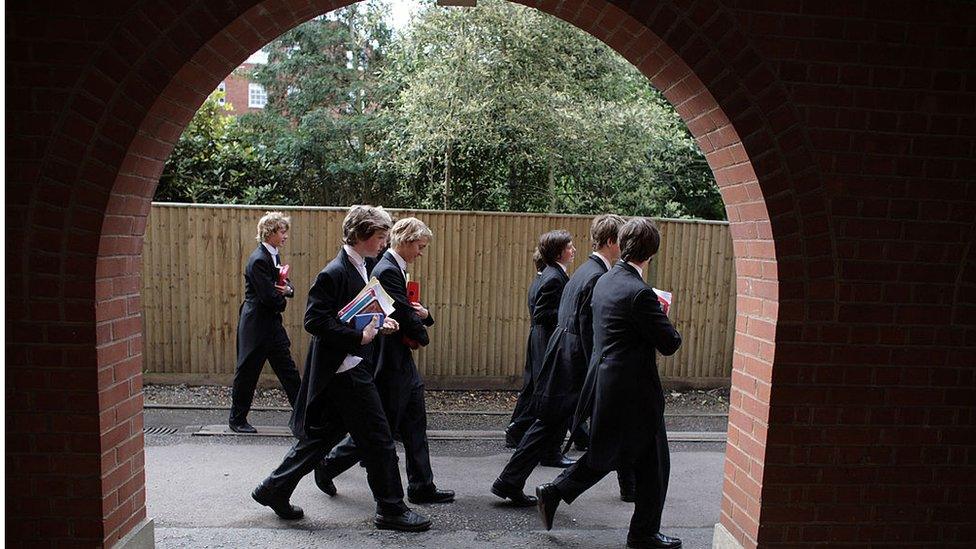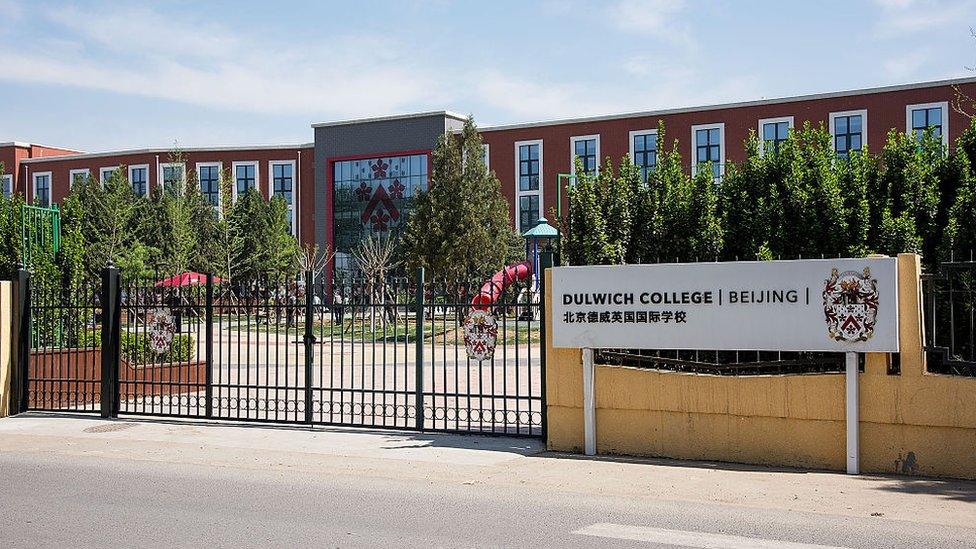Inside the secret and lucrative world of 'the super tutor'
- Published

Mark Maclaine, dubbed "a super tutor" due to his students' success rate, charges from £150 to £1,000, an hour
Education services bring in £17.5bn a year to the UK economy, but what is driving the demand for a British education and why are some parents willing to spend thousands of pounds to secure a "super tutor" for their child?
"It was on the plane over I realised I'd made a mistake," a 25-year-old private tutor tells me.
He was flying to New York to spend the summer helping to prepare a 12-year-old boy for the Common Entrance exam - a test taken by children applying to private secondary schools.
The boy's mother had insisted he sat next to the boy so he could spend the flight time teaching him.
He did an hour and then given they were spending the next three weeks together, decided to take a nap.
The next thing he knew, he was being woken up by the mother standing over him, shouting "You think this is some kind of holiday?".
Given the high fees charged by such tutors and the intense competition for places at top British schools it's perhaps not surprising that tensions can sometimes run high.
"In an already privileged world, tutoring is an extra level of pushing," he says.

Foreign students often use British tutors to prepare them for private school entrance exams
The Londoner uses the job's flexibility to fund his real passion of film production and acting. He is unwilling to be named in this article in case it jeopardises future jobs.
Yet he says the money easily makes up for the occasional difficulties. He charges anywhere from £40 to £90 an hour in the UK, although the agencies he is hired through take a 25% to 50% cut of this.
When he takes an overseas job, the fees are much higher to compensate for the fact that he can't do any other work. Typically he earns between £800 and £1,500 a week.
In three years as a tutor he's worked in India, Indonesia and Costa Rica, as well as the US.
Hiring an English tutor is increasingly common in many countries, particularly for those who want their children to go to an overseas private secondary school, he says.
The fact that he "sounds a bit posh" and went to a top London school are "valuable trading cards" in an international industry which is "a lot about image as well as actual background," he says.
This kind of tutoring is one of the British education services that makes a valuable contribution to the UK economy. Collectively, education exports were worth a whopping £17.5bn in 2011, the most recent figure available, external. This includes education products and services, income from international students in higher education as well as schools and English language lessons.

The tradition of a British education is appealing to many wealthy overseas families
Those working in the industry suggest the value is likely to have grown since then.
Mark Maclaine, who co-founded the agency, Tutorfair, in 2012 after over a decade of tutoring, says overseas demand is enormous and growing. His overseas customers are mostly from Asia, the Middle East, eastern Europe and Russia.
Dubbed "a super tutor" due to his students' success rate, he charges fees on a sliding scale, anywhere from £150 an hour up to a staggering £1,000.
At the upper end of the scale, he says it's typically consultancy. A short time to teach someone how to study and prepare for an exam independently as opposed to a continuing arrangement.
Toxic environment
Word of mouth recommendations have seen him hired by US actors and actresses and he's taught in a variety of exotic locations from a yacht sailing around the Caribbean to private islands in luxury holiday resorts.
He admits that the high pressure can create a toxic environment, and says experience has taught him to interview a family before he commits to a job.
We're speaking over the phone while he's in Bali, where he has tagged a holiday onto the end of a tutoring job.
"The British private education system is seen as one of the best in the world. Royal families, rulers of countries are very very keen that their kids get some form of education in Britain," he says.

Education is a valuable British export
The demand is high enough that two to three times a year Mr Maclaine will get an "emergency call" from a family desperate for his immediate services.
Normally these calls come when a child has failed a practice exam for a UK school and "everyone panics".
Often he'll offer to tutor by Skype, but occasionally when he's offered a "stupid amount of money" he'll agree to fly out.
"I'm a human being. I've got a mortgage to pay".
To help address the balance, Tutorfair says that for every child whose parents pay for its service it gives tutoring to another boy or girl whose mother and father, or other guardian, cannot afford to pay.
It's not just tutoring agencies cashing in on the foreign demand for a British education.

The teaching at Dulwich College, Beijing, is based on the English national curriculum
Many private schools have opened branches overseas: Harrow has schools in Hong Kong, Beijing, Shanghai and Bangkok; while Dulwich College and Wellington College both have overseas franchises in China.
Such extensions create a handy extra revenue stream for private schools as the domestic market slows.
But Charles Bonas, founder of Bonas MacFarlane, which offers tuition and also advises on choices of schools from nursery to university, says many families still prefer to send their children to school in the UK.
He says partly it's because it's a way for wealthy families with drivers and nannies to help their offspring become more independent.
But he says the main reasons that parents choose the UK is because English is spoken as a first language, and the education is deemed well-rounded - teaching children how to think critically and take risks.

Global Trade
More from the BBC's series taking an international perspective on trade:
How shops are coping with a weaker pound
The apples that need shading from the sun
How the 'better burger' is taking over the world
What it takes to get Beyonce on a world tour
The country losing out in the breakfast juice battle

Often parents only want the top name schools, he says recalling the time two years ago when the parents of a five-year-old girl said they wanted her to go to Eton next term. "They didn't take no as an immediate answer," he says.
But this is where the firm uses its consultation skills, a process costing from £3,000 to £12,000 with a relationship that can last years.
"I took on a parent last year whose children weren't even born yet. They're going to need a nursery, pre-prep, prep and a senior school," he explains.
Whether or not these arrangements are simply perpetuating inequality, Mr Bonas argues that they are of long-term benefit to the UK, and not just because of the economic boost.
"These children have often got a family business to take over and will be the movers and shakers in their world.
"If they have an affinity for Britain then that can only be a good thing," he says.